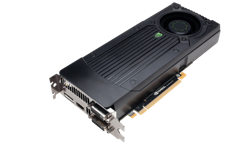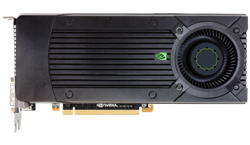
NVIDIA ha lanciato la nuova video card mainstream GeForce GTX 650 Ti BOOST, una soluzione basata sul processore grafico GK106 configurato dal maker statunitense in maniera tale da esibire 768 CUDA core attivi.
La GeForce GTX 650 Ti BOOST è disponibile in due versioni, a seconda della dimensione del frame buffer, implementato con memoria RAM di tipo G-DDR5, pari a 1GB in un caso e a 2GB nell'altro; i prezzi indicati da NVIDIA per questi due modelli (reference) sono pari a $149 e $169 rispettivamente.
Tra le specifiche ufficiali della GeForce GTX 650 Ti BOOST, che NVIDIA definisce come una scheda grafica perfetta per il gaming a 1080p, oltre che fino al 40% più veloce della GeForce GTX 650 Ti standard, citiamo le frequenze di clock del core grafico e della RAM, pari a 980MHz/1033MHz (Base/Boost) e a 1.5GHz (6Gbps) rispettivamente.
Il processore grafico e il frame buffer sono interfacciati mediante un bus a 192-bit, mentre la banda della memoria è pari a 144GB/s; inoltre la GeForce GTX 650 Ti BOOST assorbe la potenza elettrica dalla PSU mediante un connettore a 6-pin, e invia il segnale in uscita con l'ausilio di connettori di tipo DVI-I dual-link, DVI-D dual-link, HDMI e Mini-DP.
Le varianti della GeForce GTX 650 Ti BOOST equipaggiate con 2GB di RAM sono state commercializzate dai principali partner di NVIDIA, come ASL, ASUS, Colorful, ECS, EVGA, Gainward, Galaxy, Gigabyte, Innovision 3D, Jetway, Leadtek, MSI, Palit, PNY, Point of View, Sparkle e Zotac; le versioni della card con 1GB di RAM saranno immesse sul mercato nella prima parte di aprile.

[Immagine ad alta risoluzione]

[Immagine ad alta risoluzione]

Gamers looking to play this year's hottest PC games at a highly affordable price -- with in-game settings cranked up to high -- got their wish today with the introduction of the new NVIDIA GeForce GTX 650 Ti BOOST GPU. Based on the NVIDIA Kepler architecture and equipped with 768 NVIDIA CUDA cores, the GTX 650 Ti BOOST GPU is available in 2GB and 1GB configurations at an estimated $169 and $149, respectively.
With up to 40% more performance over the original GeForce GTX 650 Ti GPU introduced last year, the new GeForce GTX 650 Ti BOOST includes features typically reserved for more expensive, higher-end GPUs, including support for NVIDIA's innovative GPU Boost technology, which dynamically adjusts GPU performance to meet the real-time graphics processing demands of games, and award-winning NVIDIA SLItechnology, which allows gamers to use multiple GPUs to "double up" on performance.
With a wider 192-bit memory interface and up to 60 percent more memory bandwidth than the original, the GeForce GTX 650 Ti BOOST GPU lets gamers play their favorite games at 1080p at high-quality settings with smooth frame delivery and comfortable frame rates for even the most graphically demanding games on the market today, including Crysis 3.
And with support for NVIDIA PhysXtechnology -- the world's most pervasive physics engine for experiencing real-time, real-world effects -- games such as Hawken and Planetside 2 come alive to deliver a truly realistic interactive gaming experience.
The NVIDIA GeForce GTX 650 Ti BOOST 2GB edition is available now from the world's leading add-in card suppliers, including ASL, ASUS, Colorful, ECS, EVGA, Gainward, Galaxy, Gigabyte, Innovision 3D, Jetway, Leadtek, MSI, Palit, PNY, Point of View, Sparkle and Zotac. The GTX 650 Ti BOOST 1GB version will be available in early April.
For more information on how GeForce GTX GPUs are dramatically changing the way games are played and experienced, visit www.geforce.com/. The NVIDIA Flickr page hosts GeForce GTX 650 Ti BOOST and the entire lineup of Kepler product photos.
News Source: NVIDIA Press Release
Links

